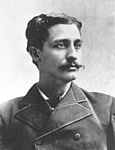This article relies largely or entirely on a single source .(September 2023) |
| | |||||||||||||||||||||
| |||||||||||||||||||||
 County results Shively: 30–40% 40–50% 50–60% 60–70% Miller: 30–40% 40–50% 50–60% Beveridge: 30-40% | |||||||||||||||||||||
| |||||||||||||||||||||
| Elections in Indiana |
|---|
 |
The 1914 United States Senate special election in Indiana took place on November 7, 1914. Incumbent Senator Benjamin F. Shively was re-elected to a second term in office over Hugh Thomas Miller and Albert J. Beveridge. This was the first popular election for United States Senator held in Indiana, as required by the Seventeenth Amendment to the United States Constitution.


